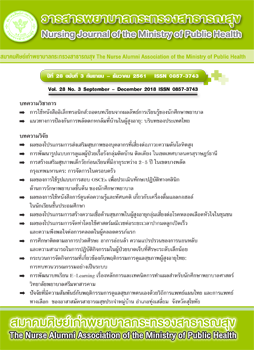Health Promotion for Preschool Aged Children whose Age 2-5 years-old in Child Developmental Center at Khet Bang Phlat, Bangkok: Family Management
Main Article Content
Abstract
This study aimed to study the ability, effort to managed, and parents’ maturity of management, and to compare the mean difference of family management in health promotion for pre-school children age between 2-5 years old at Child Development Center in Bang Phlat. Data were collected from 95 of parents, or primary caregiver through questionnaire of ability, effort, and parents’ maturity. Data analysis was using descriptive statistics and one-way ANOVA. The results indicated that parents reported the score on management ability, management effort, and parental mutuality are moderate level with mean of 43.55, 12.43, and 29.40 respectively. The mean scores of parental mutuality in health promotion were not statistically significantly different (p>.05). Parental perception on health promotion management ability from WatThepakorn Child Development Center were more than Suan Prig Children Development Center and Wat Bang Phlat Children Development Center, while parental perception on management effort from Suan Prig Children Development Center were more than WatWimuttayaram and Wat Bang Phlat. The findings will be using as a guideline for teachers and caregivers in Child Development Center to organize activities with families to participating in health promotion emphasis on health behaviors such as exercise, diet consume.
Article Details
บทความและรายงานวิจัยในวารสารพยาบาลกระทรวงสาธารณสุข เป็นความคิดเห็นของ ผู้เขียน มิใช่ของคณะผู้จัดทำ และมิใช่ความรับผิดชอบของสมาคมศิษย์เก่าพยาบาลกระทรวงสาธารณสุข ซึ่งสามารถนำไปอ้างอิงได้
References
2.Phillipd. D. Early childhood development and disability: a discussion paper 2012. Malta; World Health Organization.
3.Chusri, Wannee O. Deoisres, W. Marcia Van Riper. M. The styles of management in families having a child with thalassemia. SDU Res. J. 2016;9(3):111-26.
4.Knafl K, Deatrick J. Family management style and the challenge of moving from Conceptualization to measurement. Journal of Pediatric Oncology Nursing 2006;23(1):12-8.
5.UNICEF Thailand. Early childhood development [Internet]. 2009[cited 2017 March12]. Available:https://www.unicef.org/thailand/tha/education_6555.html
6.National Statistical Office. The results of survey on children and youth 2008 [Internet].2010[cited 2017 March12]. Available: http://service.nso.go.th/nso/nsopublish/service/child51/child Rep51.pdf
7.Faul F, Erdfelder E, Buchner A, Lang A-G. Statistical power analyses using G*Power 3.1: tests for correlation and regression analyses. Behavior Research Methods 2009; 41:1149-60.
8.Hamilton K, Spinks T, White KM, Kavanagh DJ, Walsh AM. A psychosocial analysis of parents’ decisions for limiting their young child’s screen time: an examination of attitudes, social norms and roles, and control perceptions. British Journal of Health Psychology 2016; 21(2): 285-301.
9.Mosuwan L. (2008). Nutrition in Thai children. National Institute for Children and Family Development, Mahidol University. [Internet]. 2009[cited 2017 March12]. Available: http://www.cf.mahidol.ac.th/autopage/file/MonAugust2008-12-30-1-Copy%20of%202.pdf. (InThai)
10.Nanthamongkolchai S. Family, childrearing and development of preschoolers in Thailand. Journal of Public Health 2016; 46(3):205-10. (in Thai).
11.Xu H, Wen LM, Rissel C. Associations of parental influences with physical activity and screen time among young children: a systematic review. Journal of Obesity 2015: Retrieve from https://pdfs.semanticscholar.org/10a2/b928d8035051d05b5eed55f6162624885fb7.pdf.
12.McSweeney LA, Rapley T, Summerbell CD, Haighton CA, Adamson AJ. Perceptions of nursery staff and parent views of healthy eating promotion in preschool settings: an exploratory qualitative study. BMC public health 2016;16(1):841.
13.Blaine RE, Fisher JO, Taveras EM, Geller AC, Rimm EB, Land T. Davison KK. Reasons low-income parents offer snacks to children: how feeding rationale influences snack frequency and adherence to dietary recommendations. Nutrients 2015;7(7):5982-99.
14.Teagan SH, Kyra H. Investigating mothers’ decisions to give their 2- to 3-year-old child a nutritionally balanced diet. Journal of Nutrition Education and Behavior 2016;48(4):250-7.
15.Natale RA, Messiah SE, Asfour L, Uhlhorn SB, Delamater A, Arheart KL. Role modeling as an early childhood obesity prevention strategy: effect of parents and teachers on preschool children’s healthy lifestyle habits. Journal of Developmental & Behavioral Pediatrics 2014;35(6):378-87.
16.Chusri, O. Wannee Deoisres, W, Van Riper. M, Influencing of Family Management in Families with Thalassemic Children on Health Related Quality of Life and Family Functioning: SEM approach. [internet]. [cited 2018 April 4]. Available from: http://wjst.wu.ac.th/index.php/wjst/article/view/3653

